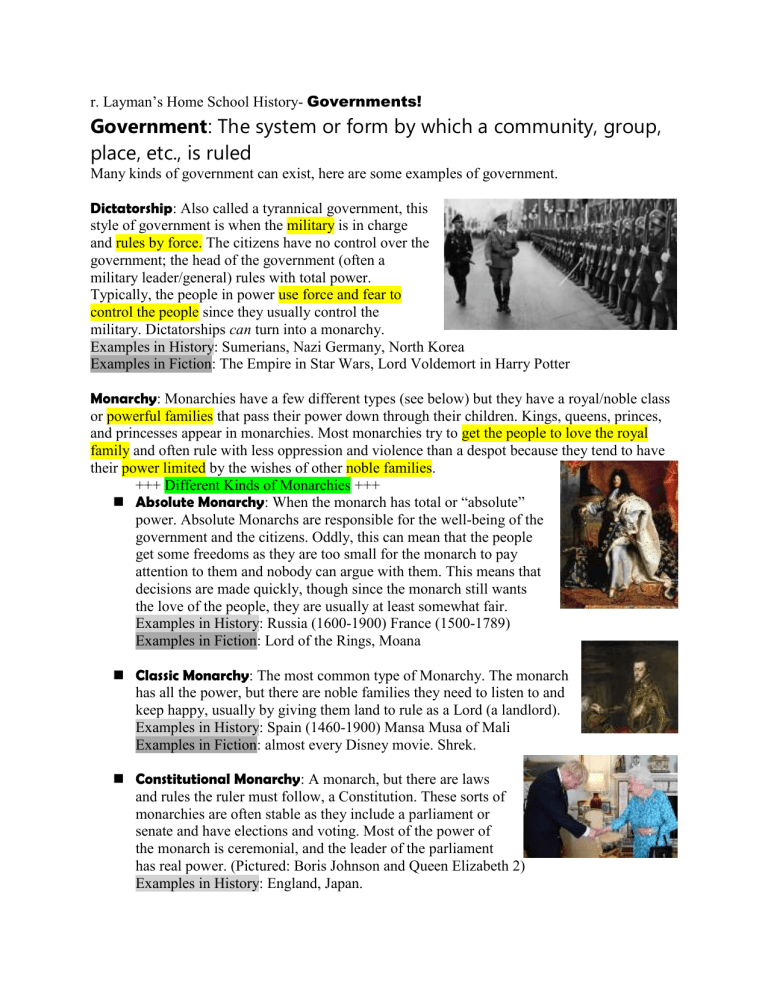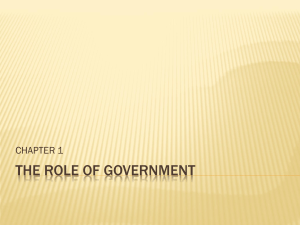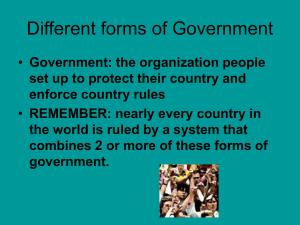
r. Layman’s Home School History- Governments! Government: The system or form by which a community, group, place, etc., is ruled Many kinds of government can exist, here are some examples of government. Dictatorship: Also called a tyrannical government, this style of government is when the military is in charge and rules by force. The citizens have no control over the government; the head of the government (often a military leader/general) rules with total power. Typically, the people in power use force and fear to control the people since they usually control the military. Dictatorships can turn into a monarchy. Examples in History: Sumerians, Nazi Germany, North Korea Examples in Fiction: The Empire in Star Wars, Lord Voldemort in Harry Potter Monarchy: Monarchies have a few different types (see below) but they have a royal/noble class or powerful families that pass their power down through their children. Kings, queens, princes, and princesses appear in monarchies. Most monarchies try to get the people to love the royal family and often rule with less oppression and violence than a despot because they tend to have their power limited by the wishes of other noble families. +++ Different Kinds of Monarchies +++ Absolute Monarchy: When the monarch has total or “absolute” power. Absolute Monarchs are responsible for the well-being of the government and the citizens. Oddly, this can mean that the people get some freedoms as they are too small for the monarch to pay attention to them and nobody can argue with them. This means that decisions are made quickly, though since the monarch still wants the love of the people, they are usually at least somewhat fair. Examples in History: Russia (1600-1900) France (1500-1789) Examples in Fiction: Lord of the Rings, Moana Classic Monarchy: The most common type of Monarchy. The monarch has all the power, but there are noble families they need to listen to and keep happy, usually by giving them land to rule as a Lord (a landlord). Examples in History: Spain (1460-1900) Mansa Musa of Mali Examples in Fiction: almost every Disney movie. Shrek. Constitutional Monarchy: A monarch, but there are laws and rules the ruler must follow, a Constitution. These sorts of monarchies are often stable as they include a parliament or senate and have elections and voting. Most of the power of the monarch is ceremonial, and the leader of the parliament has real power. (Pictured: Boris Johnson and Queen Elizabeth 2) Examples in History: England, Japan. Examples in Fiction: Skyrim (video game) Oligarchy: In an oligarchy, power is maintained by the elites (aristocrats), and they usually either rule as a group or select one of themselves to act as a spokesperson or leader of the government. This can exist in many forms but typically involve either money (plutocracy) religion (theocracy) or control over resources (kleptocracy) but they all fall under the category of oligarchy. Typically, as a society experiences a wealth gap (very few rich people, lots of poor people) those elite people can afford things like nutrition and school, putting them in an upper ruling class and allowing them to control the government more for themselves. Examples in History: Russia, Persian Empire Examples in Fiction: “The Capital” in The Hunger Games Republic: A collection of smaller groups ruling as a group using representatives and voting. In a republic, each area has its laws and selects representatives to rule as a group. Typically, a republic will elect one ruler, but they don’t always, sometimes they rule as a group or committee. This is most often seen as a collection of smaller states or city-states that work as one country. Examples in History: The United States (Federal Republic), Hanseatic League, Rome Republic, The United Nations, The Islamic Caliphate Examples in Fiction: Star Wars (Republic) Democracy: the entire population directly elects their leaders. Unlike in a republic where each place has its own rules, the laws and policies of democracy are usually equal across the entire country as are the elections. Because of this, democracies are usually limited to smaller governments and territories. Examples in History: Switzerland, most towns. Examples in Fiction: I can’t think of any! Can you?



